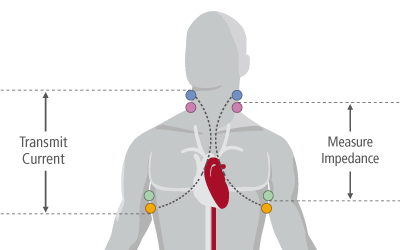MSc thesis project proposal
[2019] BioZ (bio-impedance) patch for the measurement of thoracic impedance
Project outside the university
2BMedical, Maastricht, the Netherlands / Delft University of TechnologyThe principle of TBI consists on applying an alternating current (between 1mA-5mA) at different frequencies (between 20Hz and 100kHz) through two electrodes and acquire the resulting voltage difference between other two electrodes (tetrapolar configuration). The acquired voltage is proportional to the bioimpedance variation (ΔZ) in the thoracic region. The measured bioimpedance can be measured at a single-frequency or at multi-frequencies and reconstructed using regression analysis.
This project will focus on the development of a low-power wireless patch (BioZ) for TBI monitoring. The patch should estimate, in real-time, a number of parameters, e.g. respiration rate, fluid volume and cardiac output.
Assignment
The development of the BioZ patch will involve the design of:- Bioimpedance electrodes and optimised electrode configuration (planar array)
- Low-power time-based multichannel impedance readout and wireless unit
- Control system for real-time impedance estimation
The development of the readout electronics will start at system-level (Matlab and Simulink) and will progress to a discrete development of an impedance analyser based on the use of COTS and an FPGA. Partial design of readout blocks in CMOS is possible (knowledge of Cadence required).
Requirements
Interested and motivated MSc student in BME or EEContact
dr. Virgilio Valente
Bioelectronics Group
Department of Microelectronics
Last modified: 2019-07-16
